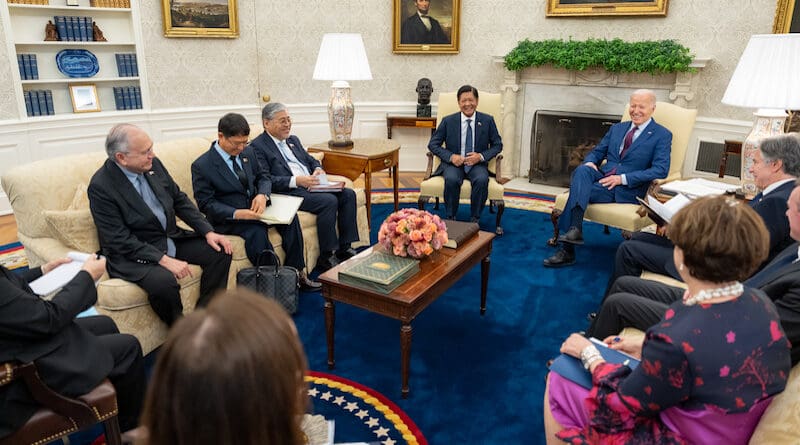Biden Hosts Japanese, Philippine Leaders To Discuss China’s Aggression
By VOA
By Patsy Widakuswara
U.S. President Joe Biden is hosting Japanese Prime Minister Fumio Kishida and Philippine President Ferdinand Marcos Jr. at the White House Thursday, aiming to send China a clear message to halt its aggressive behavior against its neighbors in the South China Sea.
The trilateral summit comes amid increased tension between Manila and Beijing. In recent weeks, Chinese Coast Guard ships have taken provocative actions to block resupply missions for Philippine soldiers stationed on the Second Thomas Shoal, who guard Manila’s sovereignty claims over the Spratly Islands.
These so-called gray zone tactics of intimidation fall dangerously close to triggering a mutual defense treaty between Washington and Manila and will be a focus in Thursday’s summit.
Key to the discussions is working toward a shared understanding on what constitutes gray zone attacks and the treaty’s enforcement threshold.
“We continue to coordinate very closely the question of China’s so-called gray zone tactics, its coercive tactics, and what the implications of those might be,” a senior administration official said in response to VOA’s question during a briefing Wednesday. The official spoke on condition of anonymity.
The U.S.-Philippines Mutual Defense Treaty extends to “armed attacks on Philippines Armed Forces, public vessels, or aircraft,” the official underscored. “That includes its Coast Guard, and that includes anywhere in the South China Sea.”
Biden and Kishida will show Marcos a “clear demonstration of support and resolve,” the official said. Leaders will convey that they “stand shoulder to shoulder with Marcos, ready to support and work with the Philippines at every turn.”
Gray zone tactics
China’s gray zone tactics have blurred the lines of what is traditionally seen as armed attacks by using force that may not be intentionally lethal, such as military-grade lasers, acoustic devices, high-pressure water cannon, or simply ramming into ships, said Gregory Poling, director of the Southeast Asia Program and Asia Maritime Transparency Initiative at the Center for Strategic and International Studies.
“The problem is that these things are only non-lethal in a statistical sense,” Poling told VOA. “But if you do it enough, you will kill somebody.”
Manila and Washington would then need to determine whether to invoke mutual defense under the treaty, he added.
Both sides are realizing that “China has blurred the lines so much with its Coast Guard and militias,” he added, saying, “We can’t treat China the way we treat normal armed actors, that China intentionally hides its military force behind civilians, and that we need to be more flexible in our responses.”
Discussions are ongoing under the Maritime Security Framework signed by the U.S. and the Philippines in 2022. Known also as “Bantay Dagat,” or “Guardian of the Sea” in Tagalog, the agreement aims to improve regional maritime domain awareness and confront maritime challenges together.
Last year, the U.S. and Philippine secretaries of defense established guidelines reaffirming that “an armed attack in the Pacific, including anywhere in the South China Sea, on either of their public vessels, aircraft, or armed forces — which includes their Coast Guards — would invoke mutual defense commitments under Articles IV and V of the 1951 U.S.-Philippines Mutual Defense Treaty.”
“Recognizing that threats may arise in several domains — including land, sea, air, space, and cyberspace — and take the form of asymmetric, hybrid, and irregular warfare and gray-zone tactics, the guidelines chart a way forward to build interoperability in both conventional and non-conventional domains,” the Biden administration said in a statement.
Dialogue with Beijing
Ahead of their trilateral summit with Marcos, Biden and Kishida insist on fostering dialogue with Beijing, even as the U.S. and Japan ramp up defense ties.
In their latest phone conversation in April, Biden said he discussed with Chinese President Xi Jinping the “best way to reduce the chances of miscalculation and misunderstanding.”
“Our alliance we have with Japan — is purely defensive in nature,” he said during a joint press conference Wednesday with Kishida. “It’s not aimed at any one nation or a threat to the region. And it — it doesn’t have anything to do with conflict. And so, this is about restoring stability in the region. And I think we have a chance of doing that.”
Speaking through an interpreter Wednesday, Kishida said he and Biden “agreed that our two countries will continue to respond to challenges concerning China through close coordination.”
“At the same time, we confirmed the importance of continuing our dialogue with China and cooperating with China on common challenges,” he added.
Biden and Kishida announced initiatives to enhance bilateral defense ties and maritime cooperation in the South China Sea, as well as air defense.
“For the first time, Japan and the United States and Australia will create a network system of air missile and defense architecture,” Biden said.
Similar announcements with the Philippines are expected Thursday.
Beijing said it opposes “cobbling together exclusive groupings and stoking bloc confrontation in the region.”
“Such practices: patching up small blocs, stirring up confrontation under the excuse of cooperation, upholding peace and order in name but flexing military muscle and stoking chaos in nature, do not meet the trend for peace and development and run counter to the regional countries’ shared aspiration for stability and development,” Liu Pengyu, a Chinese Embassy spokesperson in the U.S., said in a statement to VOA.
The U.S.-Japan-Philippines trilateral is the first gathering of its kind, part of Biden’s strategy to stitch together existing bilateral alliances into these so-called “minilaterals” to amplify U.S. influence in Asia. Last year, he hosted a similar meeting with Japan and South Korea to deal with the threat from North Korea.

